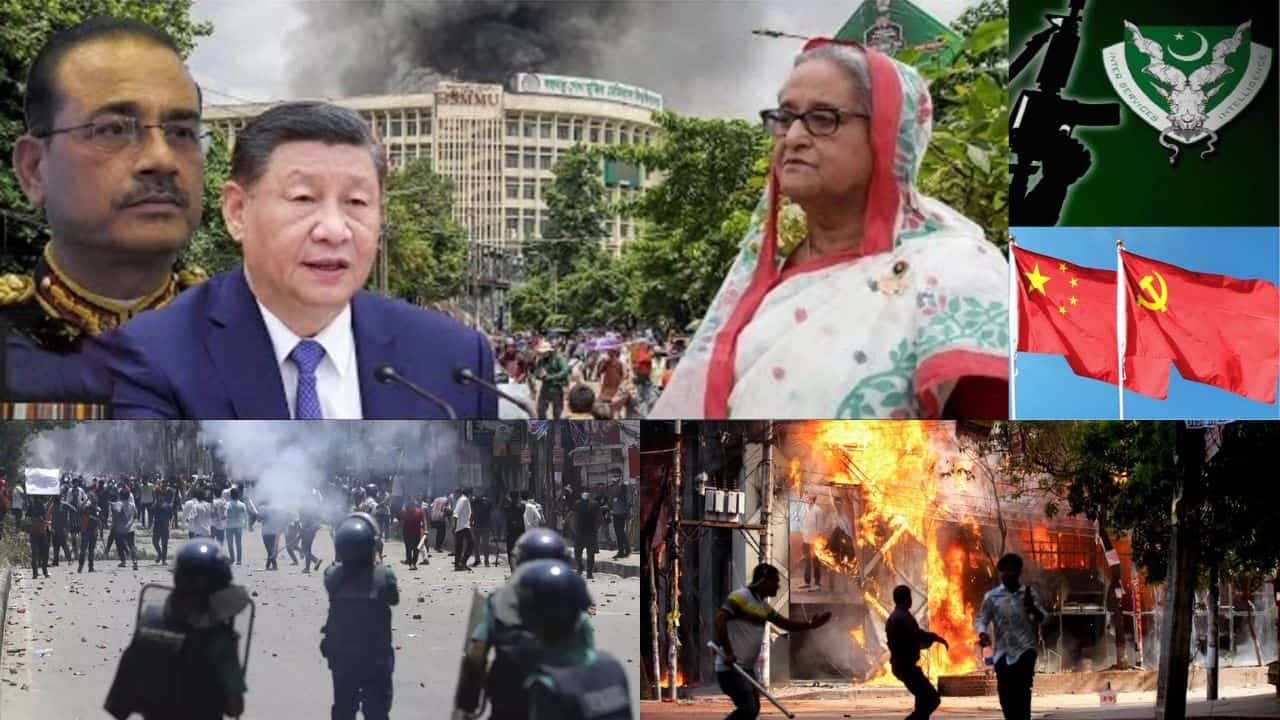The Hidden Hands Behind Bangladesh's Turmoil: ISI and China
Recent accounts have spoken of a well-organised campaign of violence against Hindus that included the burning and looting of temples, Hindu"s homes and even their businesses.
Total Views |

The recent violent riots in Bangladesh, targeting Hindus and their places of worship, have raised serious concerns about the underlying forces at play. According to various intelligence reports and recent news coverage, the involvement of Pakistan's Inter-Services Intelligence (ISI) and China in orchestrating these disturbances is becoming increasingly apparent. This article aims to unravel the complex web of influences and motivations driving the current unrest in Bangladesh, particularly focusing on the roles of ISI and China.
The Context of the Unrest
Bangladesh has been experiencing significant political and social upheaval in recent months. What began as student protests over educational quotas quickly escalated into widespread violence, resulting in the resignation of Prime Minister Sheikh Hasina and her subsequent flight from the country. The protests have not only disrupted daily life but have also led to targeted attacks against the Hindu minority, including desecration of temples and assaults on Hindu communities.
The Role of ISI
Intelligence reports suggest that the ISI, Pakistan's notorious intelligence agency, has been a key player in fueling the unrest. The ISI has a long history of meddling in the affairs of its neighbours to advance Pakistan's strategic interests. In Bangladesh, the ISI has allegedly provided substantial financial and logistical support to Islamist groups like Jamaat-e-Islami and its student wing, Islami Chhatra Shibir (ICS). These groups have been instrumental in organising and leading the violent protests.
The ISI's goal appears to be the destabilisation of the Hasina government, which has maintained a relatively balanced foreign policy, engaging with both India and China. By undermining Hasina, the ISI hopes to install a regime more favourable to Pakistan, which could provide a safe haven for anti-India terrorist groups and further Pakistan's regional agenda.
China's Strategic Interests
China's involvement in the unrest adds another layer of complexity to the situation. Beijing has significant investments in Bangladesh, including major infrastructure projects like the Padma Bridge. Despite these investments, China's relationship with Hasina has been strained due to her government's efforts to balance relations between China and India. Beijing views the potential replacement of Hasina with a more pliant regime as an opportunity to enhance its influence in the region.
Reports indicate that Chinese entities have funnelled money through Pakistan to support the Islamist groups spearheading the protests. This financial backing has enabled these groups to sustain their activities and escalate the violence. China's strategic interest lies in ensuring that Bangladesh, a key player in the regional balance of power, aligns more closely with Beijing, thereby countering India's influence.

Targeting the Hindu Minority
The systematic targeting of the Hindu minority in Bangladesh is one of the most troubling aspects during this period, and demands attention. Recent accounts have spoken of a well-organised campaign of violence against Hindus that included the burning and looting of temples, Hindu's homes and even their businesses. Across the country, Hindu temples were being sacrilegiously desecrated and numerous assaults had been reported against members of the minority community in several districts including Moulvibazar where goons launched a midnight attack on NotunKali Temple, Chittagong with burnt damage to Sri Krishna temple among other such incidents.
These are not random operations; it is the other side of a methodical campaign to terrorise and destabilise. The sectarian dimension of the violence is evident in how groups like Jamaat-e-Islam or ICS — bodies known for their anti-Indian and anti-Hindu postures, have been involved. This is to generate an atmosphere of fear among Hindus so that they start fleeing the country and then change the demographic balance a little bit in favour of Islamists.
The Geopolitical Implications
The involvement of ISI and China in the Bangladesh riots has significant geopolitical implications. For India, the stability of Bangladesh is crucial not only because of the shared border but also due to the potential for increased terrorism and insurgency in the region. A destabilised Bangladesh could become a breeding ground for extremist groups targeting India, exacerbating security challenges.
China's strategic manoeuvring in Bangladesh is part of its broader effort to expand its influence in South Asia, often at the expense of Indian interests. By supporting Islamist groups and contributing to the unrest, China seeks to weaken India's position and ensure that Bangladesh remains within its sphere of influence.
Conclusion
Trouble in Bangladesh is not just an internal affair, it's a geopolitical tussle between ISI and China as well. The well-coordinated attacks on Hindus and the military coup against Sheikh Hasina suggest that foreign forces intent on accomplishing their strategic designs could go to any extent. The efforts should be aimed at reducing the external influences that are sustaining and intensifying it as they unfold on a daily basis for international powers, including India.
Never has there been more of an urgent need for a united international initiative to bring back stability in the Bangladesh politico-religious scene and save its minorities. If left unchecked, the consequences for regional security and stability would be disastrous.
Article by
Shomen Chandra
Sub Editor, The Narrative


